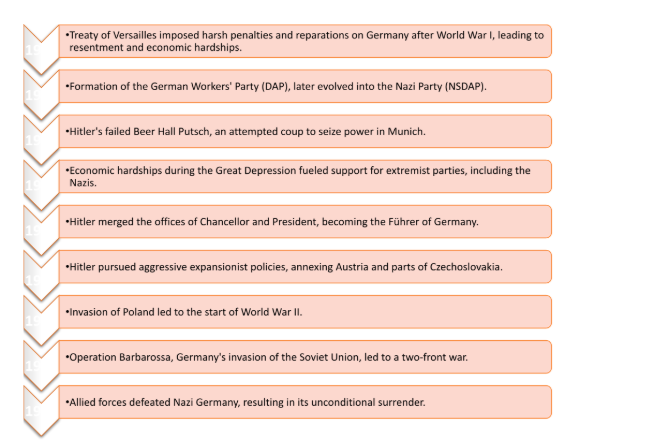German Fascism
Published on 23 Oct 2025
German Fascism refers to the totalitarian and authoritarian regime under Adolf Hitler's leadership during the 1930s, characterized by extreme nationalism, racial superiority, suppression of dissent, and aggressive expansionist policies, culminating in World War II and the Holocaust.
Timeline of the Rise and Fall of Hitler

Causes behind the Rise of Nazism in Germany
Treaty of Versailles: The humiliating Treaty of Versailles after World War I created widespread resentment among German ultranationalists as it imposed heavy reparations and territorial losses on Germany.
The Great Depression of 1929-30: It created economic hardships and unemployment in Germany leading to growing support for extremist parties, including the Nazi Party.
Fear of Communism: The rising popularity of the Social Democratic Party in Germany and the fear of communism among German capitalists and landowners (Junkers) provided support to Hitler and his anti-communist stance.
Long Tradition of Militarism: Germany had a history of militarism, and Hitler capitalized on this tradition to appeal to nationalist sentiments and a desire for a strong, militaristic state.
Factors behind the Rise of Hitler
Formation of the Nazi Party: Hitler joined the Nazi Party, and quickly became its leader by 1921.
Propaganda and Hate Speech: Hitler was a charismatic orator and used propaganda to create mass hatred against the Treaty of Versailles and various perceived enemies, including Jews, communists, and Catholics.
The Failed Munich Putsch: Hitler attempted a coup in Munich in 1923, known as the Munich Putsch, but it failed, and he was arrested and imprisoned.
Democratic Means to Seize Power: After his release from prison, Hitler changed his strategy and decided to seize power through democratic means.
Economic Impact: The economic hardships and widespread unemployment caused by the Great Depression created fertile ground for Hitler's message of economic revival and national pride.
Electoral Success: In the elections of 1932, the Nazi Party gained a significant share of the vote, and Hitler was appointed as Chancellor of Germany by President Hindenburg in January 1933.
Impact of Nazi Germany on the World
Human Rights Violations: Mussolini's regime implemented racial laws discriminating against Jews and persecuted political opponents.
Example: The enactment of anti-Semitic laws in 1938 led to the persecution and deportation of Italian Jews, contributing to human rights abuses during the fascist era.
Political Impact
World War II: Nazi Germany's aggressive expansionist policies led to the outbreak of World War II in 1939, causing immense destruction and loss of life worldwide.
Nazi Occupation: Nazi Germany occupied numerous countries during the war, subjecting their populations to harsh rule and atrocities.
Allied Victory and Division of Germany: The defeat of Nazi Germany by the Allied forces in 1945 led to the division of Germany into East and West, contributing to the Cold War.
Nuremberg Trials: After the war, leaders of Nazi Germany were prosecuted for war crimes and crimes against humanity in the Nuremberg Trials, establishing principles of international law.
Formation of United Nations: The atrocities of World War II and the Holocaust prompted the establishment of the United Nations to promote international cooperation and prevent future conflicts.
Social Impact
Holocaust: The Holocaust, the systematic genocide of six million Jews and millions of others, remains one of the most horrific acts of mass murder in human history.
Persecution and Extermination of Minorities: Nazi policies resulted in the persecution and extermination of various minorities, including Romani people, disabled individuals, and LGBTQ+ communities.
Displacement and Refugees: Nazi aggression led to millions of people being displaced, creating a refugee crisis and causing mass migrations.
Cultural Impact
Destruction of Cultural Heritage: Nazi forces targeted and destroyed cultural and historical sites in occupied territories, causing irreparable damage to humanity's cultural heritage.
Suppression of Art and Literature: The Nazi regime censored and suppressed art, literature, and intellectual expression deemed contrary to their ideology.
Economic Impact
War Reparations and Costs: Nazi Germany's aggression resulted in significant war reparations and economic costs for the defeated nation.
Marshall Plan: Post-war, Germany's recovery was supported by the Marshall Plan, a U.S. initiative to aid in European reconstruction and prevent the spread of communism.
Impact of Italian and German Fascism on India
Impact on Indian Movements: The rise of Mussolini in Europe inspired associations like the Hindu Mahasabha.
Economic Impact: Nazi aggression and war upheavals disrupted global trade, impacting India's economy under British colonial rule.
Cultural Awareness: The atrocities of the Holocaust and Nazi aggression raised awareness about the dangers of extremism, racism, and intolerance in India and around the world.
Indian National Army (INA): Subhash Chandra Bose, sought support from Nazi Germany and Imperial Japan to form the Indian National Army (INA) to fight against British rule in India.
Inspired intellectuals: Mussolini's critique of British imperialism resonated with some Indian nationalists, who viewed Italy as a potential ally in their struggle against British rule.
Tags:
History & Culture
Keywords:
German Fascism
Germany
Adolf Hitler
extreme nationalism
racial superiority
world war 2
Holocaust
Timeline of the Rise and Fall of Hitler
Treaty of Versailles
German workers party
Nazi party
Beer Hall Putsch
Munich
Austria
Czechoslovakia
Poland
Operation Barbarossa
Soviet Union
Allied force
Allied power
Great Depression of 1929
Communism
Junkers
Social Democratic Party
Causes behind the Rise of Nazism in Germany
Militarism
Factors behind the Rise of Hitler
1921
Munich Putsch
President Hindenburg
anti semitic law
Italian Jews
Nuremberg Trials
Holocaust
Persecution
Extermination
Romani people
Marshall Plan
Impact of Italian and German Fascism on India
Indian National Army
Subhash Chandra Bose
INA
SC Bose
Syllabus:
General Studies Paper 1
Topics:
World History
Related Articles
Mains Current Affairs
NTA Controversy and New Act
16th Finance Commission
MUSLIM WOMEN RIGHT TO MAINTENANCE
SHANGHAI COOPERATION ORGANISATION(SCO)
Israel and Hamas in International Criminal Court
INDIA’S REMISSION POLICY
DELHI SERVICES BILL, 2023
FISCAL FEDERALISM
Prelims Current Affairs
79th United Nations General Assembly
Financing for Sustainable Development Report 2024
International Criminal Court (ICC)
Finance Commission
Vertical Fiscal Imbalance
BRICS
East Asia Summit (EAS)
Triple-Dip La Niña
Bayesian Convolutional Neural Network
Teesta River